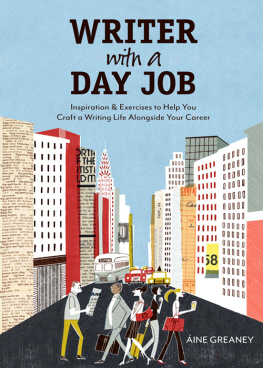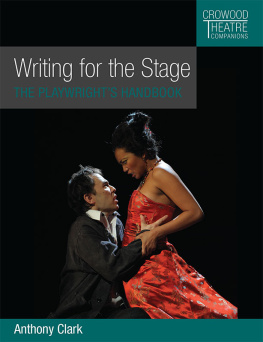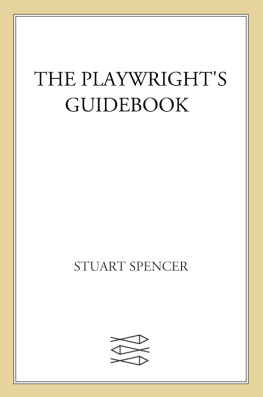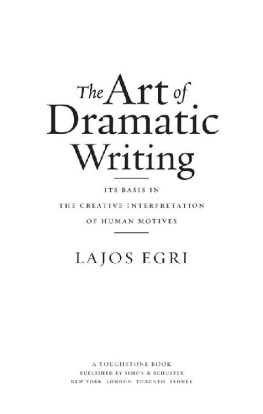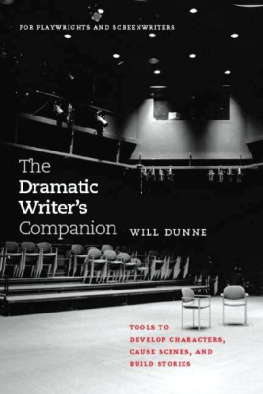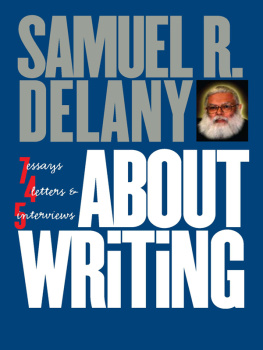A Masterclass in Dramatic Writing
A Masterclass in Dramatic Writing addresses all three genres of dramatic writingfor theater, film, and TVin a comprehensive, 14-week masterclass for the dramatic writer.
Including new material alongside revised, extended selections from Janet Neipris original and much loved book To Be a Playwright, this volume takes the writer week-by-week up to a first draft and rewrite of a dramatic work.
Brand new chapters include:
Preface: the moral responsibility of the artist
Introduction: one writers life
Creating complex characters
Comedy
Putting it all together: the making of a playA Question of Country
Checkpoints
Lessons from master teachers and students
Adapting from fact, fiction, and further.
Adding these to selections on Character, Dialogue, Sixty questions, Endings, and Rewriting, Neipris has created a stunningly useful text which works across genres.
If your goal is a completed script to be proud of, you can have no more authoritative, inspiring, and careful guide than Janet Neipris.
Janet Neipris is an award-winning playwright and Professor of Dramatic Writing at NYUs Tisch School of the Arts. Her previous publications include To Be a Playwright (Routledge, 2006), Natives (2011), Plays by Janet Neipris (2000), and the musical Jeremy and the Thinking Machine, with Barbara Greenberg (2005). Her plays and letters are in the Theatre collection of Harvard Universitys Houghton Library.
Praise for this book
Janet Neipris writes her books as she does her playsfrom a joyous heart. Drawing on her long experience as both a playwright and a professor, she combines memoir and master class to teach us not only the craft of writing, but what it means to be a writer.
Lynn Ahrens,
stage- and screen-writer and lyricist
(Ragtime, Once on this Island, Anastasia)
Neipris combines an impressive knowledge of dramatic form with her considerable experience as both an educator and writer to produce an invaluable guide for aspiring writers. Packed full of practical advice, insightful anecdote, illuminating examples, and discussion with other writers and teachersthis is no ordinary run of the mill book. Neipris book is pretty much the definitive statement on contemporary dramatic writing techniques.
Dr Tony Fisher,
Reader in Theatre and Philosophy,
Royal Central School of Speech and Drama
A Masterclass in Dramatic Writing
Theater, Film, and Television
A fully revised and extended second edition of To Be a Playwright
Janet Neipris
First published 2017
by Routledge
2 Park Square, Milton Park, Abingdon, Oxon OX14 4RN
and by Routledge
711 Third Avenue, New York, NY 10017
Routledge is an imprint of the Taylor & Francis Group, an informa business
2017 Janet Neipris
The right of Janet Neipris to be identified as author of this work has been asserted by her in accordance with sections 77 and 78 of the Copyright, Designs and Patents Act 1988.
All rights reserved. No part of this book may be reprinted or reproduced or utilised in any form or by any electronic, mechanical, or other means, now known or hereafter invented, including photocopying and recording, or in any information storage or retrieval system, without permission in writing from the publishers.
Trademark notice: Product or corporate names may be trademarks or registered trademarks, and are used only for identification and explanation without intent to infringe.
First published as To Be A Playwright by Routledge, 2005
British Library Cataloguing-in-Publication Data
A catalogue record for this book is available from the British Library
Library of Congress Cataloguing-in-Publication Data
Names: Neipris, Janet.
Title: A master class in dramatic writing: theater, film, and television/Janet Neipris.
Description: Abingdon, Oxon; New York: Routledge, 2016. | Includes index.
Identifiers: LCCN 2015049545| ISBN 9781138918528 (hardback) | ISBN 9781138918542 (pbk.) | ISBN 9781315688435 (ebook)
Subjects: LCSH: Playwriting. | DramaTechnique. | Motion picture authorship. | Television authorship.
Classification: LCC PN1661 .N445 2016 | DDC 808.2/dc23 LC record available at http://lccn.loc.gov/2015049545
ISBN: 978-1-138-91852-8 (hbk)
ISBN: 978-1-138-91854-2 (pbk)
ISBN: 978-1-315-68843-5 (ebk)
Typeset in Sabon
by Sunrise Setting Ltd, Brixham, UK
Dedicated to Harley, Andre, and Kaila
Contents
Week 11 Comedy
Mark Ravenhill
Jenny Lumet
Tina Howe
David Ives
Phyllis Nagy
Polly Stenham
Ryan Craig
Judith Johnson
Steve Kaplan
Rajiv Joseph
Zack Udko
Julia Brownell
Week 13 Master teachers and students
Brandon Jacobs-Jenkin
Tina Howe
David Tolchinsky
Richard Walter
Barbara Greenberg
Mark Ravenhill
Kristoffer Diaz
Femi Euba
Sabrina Dawhan
Steve Waters
James Felder
Tony Fisher
Leah Franqui
Lauren Gunderson
Benjamin Goldthorpe
Robert B. Cohen
A Masterclass in Dramatic Writing is a one-semester 14-week course in playwriting, screenwriting, and writing for TV.
The goal is a completed script for theater, film, or TV. It is the only book of its kind covering all three genres, and is based on chairing and teaching at Tisch School of the Arts, New York Universitys Dramatic Writing Program and International Writing Program. The text takes the writer, week by week, to the completion of a first draft and one rewrite of a dramatic script. An introduction, One writers life, and the preface, The moral responsibility of the artist, are assigned reading before starting. The semesters fourteen chapters are each accompanied by weekly exercises and progressive assignments.
With fourteen teaching chapters and essays, A Masterclass incorporates requested material from the original text of To Be a Playwright in addition to three-quarters new material.
What is the artists responsibility to the public?
Why is a moral stance paramount in the arts?
Is the personal life of the author separate from their subject?
Can bad people make good art?
The artists work is to reflect the face of society, to show us ourselves, and to create meaning so we can better understand our lives.
Morality is defined by the Oxford English Dictionary as:
Pertaining to human character or behavior considered good or bad, and the distinction between right and wrong in relation to the actions, volitions, or character of responsible beings.
When writing dramatic scripts, you learn that character is action, and we are defined only by what we do, and not by what we say. A woman or man can claim they are a good person in the morning, but go home and murder their brother that night. We are our choices, and its these choices that represent our characters morality. Joan Didion, in her book of essays, Slouching Towards Bethlehem, marks the beginning of adulthood as the act of taking responsibility for your decisions.


